Matt Rees's Blog - Posts Tagged "publishing"
Ingenious book readings: Just don't mention books!

In his terrific book "On Writing" Stephen King notes that he once asked Amy Tan what she's NEVER asked about at public readings. "They never ask about the writing," Tan tells him. Which spurs King to write a book about exactly that.
Now controversial UK publishing guru Scott Pack goes one better. Public appearances by writers. With no readings. And no questions about...books.
The idea, as Scott explains here, is to get writers talking about their life and interests outside their books. Ultimately of course I think that'll take them back to their books. But it's a great way to refresh the rather tired world of literary events. For more on Scott's plan, look at his blog.
Published on July 12, 2009 01:13
•
Tags:
blogs, book, fiction, king, literature, publishing, readings, stephen, tour
A Gripping Read, or Gripping your Read

I’m delighted to present a guest blogger today whose terrific new novel STOP ME is out tomorrow. Richard Jay Parker was born in the same South Wales town as me, just around the corner from where my parents now live. In our different ways, clearly, the mean streets of Newport shaped a real pair of sickos. STOP ME’s conceit is a truly riveting one: “Vacation Killer” sends out a chain email declaring that he’s kidnapped a woman and that if you don’t forward the email to 10 friends he’ll “slit the bitch’s throat.” Here Richard grapples with something that has many authors wishing they could slit the throat of the inventor – digital reading devices.
I'm not pro or anti when it comes to Kindle and Reader so, for my blog, I thought I'd have a dialogue with myself - with no agenda - and see what comes of it. Fortunately, this insures me against having to write anything cohesive.
Would I buy a Reader? The answer is a categoric 'yes' - if it can enrich my life. It's my criteria for investing in any new technology and I suspect it's most other people's as well. Things move fast in this world and I've always been willing to embrace new technology - if it can do something for me. I'm not one for wanting the latest gadget just because it's the latest gadget. You always get a reflex purchase reaction from a certain percentage of the population to any new gizmo. I think that's what we're seeing at the moment. We saw it with video, dvd and iPhone and we also saw it with Betamax, laserdisc and minidisc.
What can a Reader offer me on a personal level? Currently it's being sold on the notion that no longer will I have to take unwieldy hardbacks on holiday and that I'll be able to download and store all my books neatly and conveniently. I rarely buy hardbacks so it's no hardship to put a selection of paperbacks into a suitcase so that's not particularly tempting me. There's the cost implication of course. E books are cheaper but then you have to buy the Reader in the first place and can I be bothered to do a calculation of how many cheaper books I'll have to read on it before I've made the money back. Not really
But I do recognise that for busy professionals - particularly in the industry - loading a plethora of reading material onto something so neat has got to be a huge plus. But how many of us will that appeal to? There's also the benefit of being able to load your entire library onto it - as you would music onto your iPod. An incredible concept. The notion of so much on something so little is a design that has driven mankind's quest for technological advancement since the beginning of the 20th century. I'm certainly somebody who enjoys access to a large portable archive of music but I don't know if I really want to dip into my reading collection other than at home - my current paperback is usually sufficient when I'm out and about. One Reader is now being made to look just like that book.
So, although it doesn't convince me personally, the Reader does what all new technology should and makes life easier and services a need. There is a human need I can think of that it doesn't service though.
I was chatting to some friends of mine who make all their money from Internet technology. I'd noticed that their shelves were still groaning with new books, dvd box sets and cds and asked them why they didn't download all they wanted from the net. They said they still loved the physical presence of a product - the cover and packaging as a solid testament to the money they'd spent on it and the time they'd spent with it. It was a part of their life and a badge to visitors to their home of what they rated and liked. So rather than press one button and have Sky Plus conveniently record every episode of a series on a hard drive they still wanted the box set as a record of their involvement with it.
I've downloaded a lot of music but if you believed the portents of doom of a decade ago there should now be no physical music outlets left. Some have closed - the nature of shopping has had to make room for the internet but people are still tactile beings - they still like to browse. I think books are even more of a physical experience. A gripping read means just that to me.
I was speaking to someone on Twitter yesterday who is gradually loading up their Reader with their favourite books. However, she still said she loved the feel and smell of real books and had hundreds on her shelf.
Another anti Reader argument is that e books will see a flood of inferior books being self published. On a positive note this does also mean that we'll be able to discover some original voices that the current publishing system precludes.
When I started downloading music I discovered some great new artists that I normally wouldn't have had access to. I was also able to become more choosy and the dross I could quickly identify and dispense with. Moreover, it re-affirmed that having a system that sieves out inferior artists is necessary and although the publishing industry isn't infallible (and has foisted some execrable rubbish on society) it does develop and allow the best talent to shine. It's still quality that will out for an ever more discerning public.
To get away from the music/book analogy I suppose books and Readers are like real food and food pills. Convenience is never going to completely outstrip the need for the real thing.
Sci-fi writers' predictions always presuppose (for the sake of a good story) that man's trajectory into the future is a straight line. They don't account for the fact that we're an aesthetic race with a healthy respect for what has worked in the past. It's why we're not all content to live in aseptic, minimalist techno pads but instead crave period property and want to preserve our heritage.
Not to say that the book is outmoded though. It's a simple model that works as well today as it always has.
I'd be lying if I said that, throughout my life, I haven't fallen out of love with books but I've always come back to them and there's a reason for that. The book has survived my fads, banning, burning, cinema, TV, video, dvd, Gameboy, Karaoke and Wii so I'm sure it can weather the appearance of a smarter cousin trying to be a simultaneously thicker and thinner version of it.
Mobiles changed the way we converse (and unfortunately the way we have to listen to others converse) but not many of us are disposing of our landline.
I'm not becoming anti Reader. I actually believe the two can happily co-exist. I can't think of any instances now when I'd use a Reader but I'm certainly not ruling one out.
Sure there's a lot of doom and gloom in publishing at the moment but any industry that thinks it's recession proof is arrogant indeed. We're all experiencing it on every level. Obviously the Reader contractual ramifications for publishers and authors are an additional headache but as with every threat to western civilisation as we know it we always emerge the other side. Wiser? Probably not because there's always a new fear to fill up column inches and keep us awake at night.
I also don't buy the argument that it's a generational thing - that when the yellowing book reactionaries have snuffed it the new technology will rise. If that was the case why, with all the home entertainment technology listed above, do children still queue round the block in fancy dress to get their hands on the new Harry Potter? And that's the key phrase here 'get their hands on.' We'll leave media hysteria and peer pressure for another blog but these books are definitely being read. They're something we're familiar with from the time we put our smudgy hands all over a pop-up book.
But at some stage I will go and have a look at the new Reader - weigh it in my hand but, more importantly, weigh up whether or not I'm going to benefit from it. I can't wait to read the next chapter in this saga and - on a personal level - to feel the pulp between my fingers when I turn the page.
Published on August 03, 2009 22:44
•
Tags:
blogs, crime, digital, electronic, fiction, publishing, thrillers, wales
Five smokes and a new novel: Klaus Modick’s Writing Life
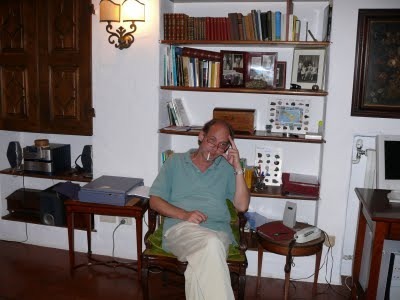
When my second novel A GRAVE IN GAZA was being translated into German, I received an email from my translator. He had a number of penetrating questions about certain phrases I'd used in the book. He also happened to be the only translator who asked me a question about any of my books (and my work is translated in 22 languages so far.) Perhaps it’s not for nothing that Germany is the country where that particular book seems to have had the greatest resonance. It’s also not for nothing that the translator was one of Germany’s most significant literary voices in his own right. I later met Klaus Modick last year in Hamburg, not far from his North German home in Oldenburg. Within 15 minutes, he had smoked five cigarettes and between us we’d come up with the plot for another of my Palestinian detective novels--with a Berlin angle. It's fair to say, we clicked. In return for his plot brainstorming, Klaus asked only that I name a good character “Klaus” and that, as it’ll be a murder mystery, he shouldn’t die too violently. This year in Leipzig Klaus and I chatted over dinner about the German literary landscape. I found it astonishing to hear how rare it is for a German writer to be translated into English. So I’m delighted to give you the insights of this fabulous, sensitive writer, who’s currently summering in that least Germanic of American cities, Los Angeles.
How long did it take you to get published?
My first books were academic literary criticism and thus do not really count. My first novella “Moos” (1984) was rejected by a couple of publishers, but after some months of straying and drifting over editors’ desks it was eventually accepted and became a so called critics’ success, i.e. praises but sales to cry for.
Would you recommend any books on writing?
I don’t think the circulating How-to-write-books-books are helpful. There’s no advice to talent or inspiration. But I did enjoy Stephen King’s “On Writing”, because it is very honest and unpretentious. And I also enjoyed Thomas Mann’s “Novel of a Novel” about the making of his novel “Doktor Faustus”. You can learn from it that ingenuity cannot be learned.
What’s a typical writing day?
Get up at about 8 o’clock, jog through the park, have breakfast, sit on desk, wait for inspiration which is like a cat (doesn’t come when called but only if it wants to), start editing and re-writing yesterday’s shift and use that as a springboard for today’s. Sometimes it works. Have lunch. Have a nap. Afternoons are for research, for reading and correspondances, also for daydreaming about all the great works I haven’t started yet and perhaps never will.
Plug your latest book. What’s it about? Why’s it so great?
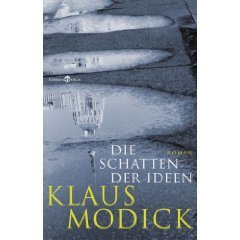
It’s a novel about a German-jewish historian who escapes from the Nazis in 1935, emigrates to the USA, struggles through the miseries of exile, makes finally a career at a New England college - but eventually falls victim to the McCarthy witchhunt in the early 50’s. It’s a book about America, seen through the eyes and experiences of a German there. It’s called “Die Schatten der Ideen” (The Shadows of Ideas). If at all and why it’s great should be decided by the reader - the least I can say about it it’s pretty voluminous.
How much of what you do is:
a) formula dictated by the genre within which you write?
Very little to nothing
b) formula you developed yourself and stuck with?
Pretty much all
c) as close to complete originality as it’s possible to get each time?
I’m trying hard ...
What’s your favorite sentence in all literature, and why?
“This is my favorite book in all the world, though I have never read it.” It’s the first sentence of William Goldman’s “The Princess Bride”. It is still my favorite book in all the world and I’m quite jealous about not having written it myself.
What’s the best descriptive image in all literature?
If one picks “the best” one wrongs at least one hundred others. One candidate among the hundreds could be the golden dollar nailed to the mast of the “Pequod” in Melville’s “Moby Dick”.
How much research is involved in each of your books?
Depends on the subject. For “Schatten der Ideen” it took me about a whole year to get my facts together in order to get the fiction. But I have also written books which needed nearly no research.
Where’d you get the idea for your main character?
I ask myself who I could be if I would not be the one I am.
Do you have a pain from childhood that compels you to write? If not, what does?
Not specifically. But I do think that everybody who writes misses something in life (same for readers). R. L. Stevenson once said that writing means to an adult what playing means to the child. That means that not only pain and suffering compel us to write but also pleasures and fun, not only the lack of something but also affluence. (W. Somerset Maugham thought so, too.)
What’s the best idea for marketing a book you can do yourself?
Give it to a reader who will recommend it to another reader who will recommend it to the next and ever so on. Worldwide.
What’s your experience with being translated?
It’s flattering. And it’s interesting, because one realizes that the book one wrote is more than this one and very book. It has siblings now.
Do you live entirely off your writing? How many books did you write before could make a living at it?
I live entirely from writing, or to be more precise from the royalties. That includes not only my own books, but also translations and writing for the media. But my own books are the core of it all.
What’s the strangest thing that happened to you on a book tour?
Being introduced to the audience as someone else.
What’s your weirdest idea for a book you’ll never get to publish?
Writing the truth.
UK cover for THE FOURTH ASSASSIN
It's always a thrill for me to receive the covers of my forthcoming novels from my UK publisher Atlantic Books. They have a series feel in that there's a continuity to the design. Each one seems to get better. Here's the cover of THE FOURTH ASSASSIN, which will be published next February. I received it from my delightful editor in London Sarah Norman just this week.
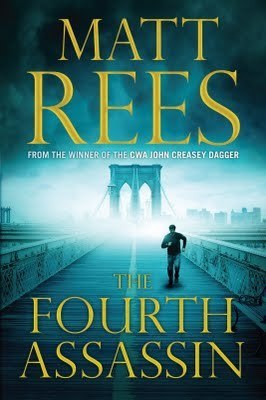
In THE FOURTH ASSASSIN, Omar Yussef leaves his regular haunts in the West Bank and Gaza Strip. He travels to New York for a UN conference, he's eager to visit his youngest son, Ala, who lives in Bay Ridge, a Brooklyn neighborhood with a large Palestinian community. He arrives at Ala's apartment to find the door ajar and a headless body in one of the beds. He's initially terrified that the dead man is his son, but soon Ala arrives and identifies the body as that of one of his roommates. He's convinced that his other roommate is the killer. But when the cops show up, Ala refuses to give an alibi and is arrested. Desperate to prove his son's innocence, Omar Yussef investigates. The murderer has left clues that refer to the Assassins, a medieval Shiite sect. When they were teenagers, Ala and his roommates had a club by that name. What's the connection? As Omar Yussef delves deeper, he uncovers a deadly international conspiracy.
On the subject of covers: My first Palestinian crime novel is just out in Indonesia (the second in the series A GRAVE IN GAZA was published there earlier this year). My wonderful editor at Dioma in Malang, Herman Kosasih, sent me copies of THE COLLABORATOR OF BETHLEHEM with, frankly, one of my favorite covers produced anywhere in the world for any of my books.
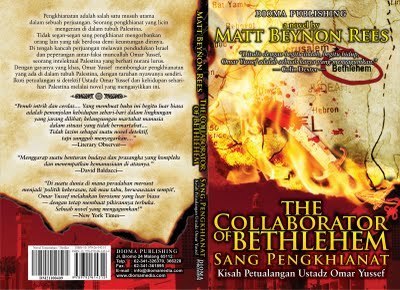

In THE FOURTH ASSASSIN, Omar Yussef leaves his regular haunts in the West Bank and Gaza Strip. He travels to New York for a UN conference, he's eager to visit his youngest son, Ala, who lives in Bay Ridge, a Brooklyn neighborhood with a large Palestinian community. He arrives at Ala's apartment to find the door ajar and a headless body in one of the beds. He's initially terrified that the dead man is his son, but soon Ala arrives and identifies the body as that of one of his roommates. He's convinced that his other roommate is the killer. But when the cops show up, Ala refuses to give an alibi and is arrested. Desperate to prove his son's innocence, Omar Yussef investigates. The murderer has left clues that refer to the Assassins, a medieval Shiite sect. When they were teenagers, Ala and his roommates had a club by that name. What's the connection? As Omar Yussef delves deeper, he uncovers a deadly international conspiracy.
On the subject of covers: My first Palestinian crime novel is just out in Indonesia (the second in the series A GRAVE IN GAZA was published there earlier this year). My wonderful editor at Dioma in Malang, Herman Kosasih, sent me copies of THE COLLABORATOR OF BETHLEHEM with, frankly, one of my favorite covers produced anywhere in the world for any of my books.

Published on August 14, 2009 04:52
•
Tags:
assassin, bethlehem, britain, collaborator, crime, fiction, fourth, indonesia, matt, nablus, omar, palestine, palestinians, publishing, rees, samaritans, yussef
My bogus bio
Here's my latest post on the International Crime Authors Reality Check blog:
Since you’re reading this, you don’t care who I am. So I can be anyone I like. At least, that’s what somebody wrote here recently.
I posted on this blog a couple of weeks ago about Dashiell Hammett. I noted that, while a university literature student, I grew tired of all the post- structuralist and deconstructionist and Marxist esoterica I was studying. I picked up a copy of Hammett’s classic “The Maltese Falcon” and found myself transported into a gritty world, a world inhabited by real criminals, it seemed to me.
At the time, I was a real criminal. Only in the sense that I had shoplifted repeatedly (I stole books, including one by my university tutor) and indulged in proscribed intoxicants (including once with my university tutor). Not the kind of criminal Hammett revealed to me in his pages. Just a criminal, but not a bad guy.
In my recent post, I posited the idea that part of what made Hammett so good at writing about criminals was his career as a Pinkertons agent. For those not familiar with US law enforcement history, the Pinkertons were a private security agency whose men worked as detectives, but also did anti-union rough stuff, too.
This idea caught the attention of a fellow blogger who wrote that I was “romanticizing” Hammett. “Writers can toot their horn all they want,” he commented on this blog, “but an author’s bio is the least important — and least read –part of a novel for a reason.”
I think the “reason” may have less to do with readers’ lack of interest in an author’s bio than it has to do with the lack of information in the author’s bio. On a copy of a recent novel by Philip Roth, I learned in his bio that he exists only as a recipient of literary prizes (of which many were listed). He wasn’t born. He may not even write his books. He just collects prizes for them.
Nonetheless, if writers bios aren’t looked at (and are anyway not important), I plan to start including all the information about me which I’ve previously edited out. (In the past, as my novels are about the Middle East, I’ve included mainly just the facts that I was – unlike Philip Roth – born, and that subsequently I went to live and work in the Middle East, where much of what I’ve seen and heard makes its way into my books.)
Here’s my bogus new bio, which qualifies me to write about the Middle East, just as much as my previously available bio, according to some people (Note that only one fact listed below is correct. A free copy of my latest novel to the first person to identify which fact that is…):
Matt Beynon Rees was born in the George Michael Public Restroom on Rodeo Drive, Los Angeles. He was a milk monitor at kindergarten in Cardiff, Wales, until then-Education Minister Margaret Thatcher cut free milk from the schools budget, thus making five-year-old Rees the first of her four million unemployed. He graduated with a degree in finance from the Buddhist seminary at Mt. Baldie, where he minored in Leonard Cohen studies. He flew Tornado jets in the first Gulf War and was shot down over Iraq, trekking 400 miles across the desert to safety in Kuwait with nothing to drink but the urine of passing Arabs. He won Winter Olympic Bronze in the Darts Biathlon (cross country skiing with stops during which contestants must hit treble twenty and drink a lager). He was a ground-breaking radio ventriloquist on the BBC light entertainment program “Gottle of Geer,” until a producer saw his lips move and fired him. His first work of nonfiction “Get the Wife You Don’t Deserve” was an Esquire Book of the Year. He has been married six times, always to Mexican women below five feet in height (in homage to John Wayne, who did the same). He holds honorary degrees from the Mississippi State University School of Floral Management and from the Bob Jones University Department of Satanic Sociology. He lives in his house.
Since you’re reading this, you don’t care who I am. So I can be anyone I like. At least, that’s what somebody wrote here recently.
I posted on this blog a couple of weeks ago about Dashiell Hammett. I noted that, while a university literature student, I grew tired of all the post- structuralist and deconstructionist and Marxist esoterica I was studying. I picked up a copy of Hammett’s classic “The Maltese Falcon” and found myself transported into a gritty world, a world inhabited by real criminals, it seemed to me.
At the time, I was a real criminal. Only in the sense that I had shoplifted repeatedly (I stole books, including one by my university tutor) and indulged in proscribed intoxicants (including once with my university tutor). Not the kind of criminal Hammett revealed to me in his pages. Just a criminal, but not a bad guy.
In my recent post, I posited the idea that part of what made Hammett so good at writing about criminals was his career as a Pinkertons agent. For those not familiar with US law enforcement history, the Pinkertons were a private security agency whose men worked as detectives, but also did anti-union rough stuff, too.
This idea caught the attention of a fellow blogger who wrote that I was “romanticizing” Hammett. “Writers can toot their horn all they want,” he commented on this blog, “but an author’s bio is the least important — and least read –part of a novel for a reason.”
I think the “reason” may have less to do with readers’ lack of interest in an author’s bio than it has to do with the lack of information in the author’s bio. On a copy of a recent novel by Philip Roth, I learned in his bio that he exists only as a recipient of literary prizes (of which many were listed). He wasn’t born. He may not even write his books. He just collects prizes for them.
Nonetheless, if writers bios aren’t looked at (and are anyway not important), I plan to start including all the information about me which I’ve previously edited out. (In the past, as my novels are about the Middle East, I’ve included mainly just the facts that I was – unlike Philip Roth – born, and that subsequently I went to live and work in the Middle East, where much of what I’ve seen and heard makes its way into my books.)
Here’s my bogus new bio, which qualifies me to write about the Middle East, just as much as my previously available bio, according to some people (Note that only one fact listed below is correct. A free copy of my latest novel to the first person to identify which fact that is…):
Matt Beynon Rees was born in the George Michael Public Restroom on Rodeo Drive, Los Angeles. He was a milk monitor at kindergarten in Cardiff, Wales, until then-Education Minister Margaret Thatcher cut free milk from the schools budget, thus making five-year-old Rees the first of her four million unemployed. He graduated with a degree in finance from the Buddhist seminary at Mt. Baldie, where he minored in Leonard Cohen studies. He flew Tornado jets in the first Gulf War and was shot down over Iraq, trekking 400 miles across the desert to safety in Kuwait with nothing to drink but the urine of passing Arabs. He won Winter Olympic Bronze in the Darts Biathlon (cross country skiing with stops during which contestants must hit treble twenty and drink a lager). He was a ground-breaking radio ventriloquist on the BBC light entertainment program “Gottle of Geer,” until a producer saw his lips move and fired him. His first work of nonfiction “Get the Wife You Don’t Deserve” was an Esquire Book of the Year. He has been married six times, always to Mexican women below five feet in height (in homage to John Wayne, who did the same). He holds honorary degrees from the Mississippi State University School of Floral Management and from the Bob Jones University Department of Satanic Sociology. He lives in his house.
Acknowledge no one
Here's my latest post on the International Crime Authors Reality Check blog:
Authors are posturing, self-aggrandizing assholes. At least, that’s the conclusion I’ve reached after noting the trend for excessive “Acknowledgements” growing like mold over page on page of nonfiction books. These days they’re spreading their blight all over novels, too.
Here’s how I think it breaks down.
More than a few paragraphs of Acknowledgements in nonfiction: the author is trying to show how in-depth he went, how many experts he befriended, how much those experts and sources went out of their way to contribute to his work of genius. But it’s a sign of insecurity, a fear that the book itself won’t demonstrate any of those things.
More than a couple of lines in a novel (I don’t really approve even of that): a lonely soul who wants to reach out to his few remaining friends, or a journalist manqué who wants to prove that his work is grounded in reality by laying bare his research sources.
In both cases, it’s an exercise that’s of no use to a reader. In fact, it can turn readers against a writer. This reader, anyway.
The thanks to wife and kids which are the conclusion de rigeur of all Acknowledgments typically can be translated thus: “thank you for putting up with my utter and total absorption in my great work. I’m a genius and it took you lovely, lovely people to realize it and to make the sacrifices that give me the space to work.”
Take for example my university tutor. A delightful man. But in one of his many books, his acknowledgements ended with thanks to his wife for “keeping the black coffee coming” as he labored over his text late into the night. His wife was a major feminist literary theorist. I wondered what she thought of being cast as a good little woman. They’re since divorced, so perhaps I know now what she thought.
Among my foreign correspondent pals, there’s another element of weirdness to the Acknowledgments in their books.
First, you have to put in plenty of fellows with foreign names, so everyone will know that you got tight with the locals and didn’t get all your info from the US Embassy.
Second, you have to name all the other correspondents who hung out at parties with you. I’ve been named in the Acknowledgments of a number of books. In most cases I didn’t read the manuscript. Neither did I aid in the researching of the book. Maybe I shared a taxi with the fellow or cooked him dinner one night. I helped one of them get laid.
That gets me into their Acknowledgements pages?
Fiction Acknowledgements are even more troublesome. They started with writers thanking people who’d acted as sources. Let’s say a crime writer thanking a real-life detective who told him which donuts cops like best.
But now writers feel the need to thank their editors and their agents. Not me. My agent gets her percentage. That’s how she knows I love her. (Which I do.)
I met a good friend of mine at an Upper West Side diner in New York a couple of years ago. He’d just sent in the manuscript for his second book. It had taken him eight years to follow up on his prize-winning debut. He’d been awarded a number of fellowships in the meantime, but he was feeling pressured to add an Acknowledgements page with the names of the many people who’d contributed advice and support during that lengthy period.
“But in the end I wrote the damned book.” He stabbed at the bananas in his oatmeal with each syllable. “Just me.”
We settled on a brief, tasteful Acknowledgements in which he only thanked the universities and foundations that had given him shelter or money. Everyone else would have to make do with a thank-you note.
Why do I really dislike Acknowledgements? In fiction, in particular, I find there’s something juvenile about them. There’s a reason why rock bands fill their liner notes with chums they’d like to thank for letting them sleep on the floor, while fine artists don’t paste the names of their best buddies all over the gallery wall.
Then there’s the “luvviness” of it all. They start the music at the Oscars after 45 seconds of gushing from the winners. How many book Acknowledgements can you get through in that time these days?
Authors: If someone deserves your thanks so very much that you just can’t hold it in, just dedicate the book to them. Acknowledge no one.
Authors are posturing, self-aggrandizing assholes. At least, that’s the conclusion I’ve reached after noting the trend for excessive “Acknowledgements” growing like mold over page on page of nonfiction books. These days they’re spreading their blight all over novels, too.
Here’s how I think it breaks down.
More than a few paragraphs of Acknowledgements in nonfiction: the author is trying to show how in-depth he went, how many experts he befriended, how much those experts and sources went out of their way to contribute to his work of genius. But it’s a sign of insecurity, a fear that the book itself won’t demonstrate any of those things.
More than a couple of lines in a novel (I don’t really approve even of that): a lonely soul who wants to reach out to his few remaining friends, or a journalist manqué who wants to prove that his work is grounded in reality by laying bare his research sources.
In both cases, it’s an exercise that’s of no use to a reader. In fact, it can turn readers against a writer. This reader, anyway.
The thanks to wife and kids which are the conclusion de rigeur of all Acknowledgments typically can be translated thus: “thank you for putting up with my utter and total absorption in my great work. I’m a genius and it took you lovely, lovely people to realize it and to make the sacrifices that give me the space to work.”
Take for example my university tutor. A delightful man. But in one of his many books, his acknowledgements ended with thanks to his wife for “keeping the black coffee coming” as he labored over his text late into the night. His wife was a major feminist literary theorist. I wondered what she thought of being cast as a good little woman. They’re since divorced, so perhaps I know now what she thought.
Among my foreign correspondent pals, there’s another element of weirdness to the Acknowledgments in their books.
First, you have to put in plenty of fellows with foreign names, so everyone will know that you got tight with the locals and didn’t get all your info from the US Embassy.
Second, you have to name all the other correspondents who hung out at parties with you. I’ve been named in the Acknowledgments of a number of books. In most cases I didn’t read the manuscript. Neither did I aid in the researching of the book. Maybe I shared a taxi with the fellow or cooked him dinner one night. I helped one of them get laid.
That gets me into their Acknowledgements pages?
Fiction Acknowledgements are even more troublesome. They started with writers thanking people who’d acted as sources. Let’s say a crime writer thanking a real-life detective who told him which donuts cops like best.
But now writers feel the need to thank their editors and their agents. Not me. My agent gets her percentage. That’s how she knows I love her. (Which I do.)
I met a good friend of mine at an Upper West Side diner in New York a couple of years ago. He’d just sent in the manuscript for his second book. It had taken him eight years to follow up on his prize-winning debut. He’d been awarded a number of fellowships in the meantime, but he was feeling pressured to add an Acknowledgements page with the names of the many people who’d contributed advice and support during that lengthy period.
“But in the end I wrote the damned book.” He stabbed at the bananas in his oatmeal with each syllable. “Just me.”
We settled on a brief, tasteful Acknowledgements in which he only thanked the universities and foundations that had given him shelter or money. Everyone else would have to make do with a thank-you note.
Why do I really dislike Acknowledgements? In fiction, in particular, I find there’s something juvenile about them. There’s a reason why rock bands fill their liner notes with chums they’d like to thank for letting them sleep on the floor, while fine artists don’t paste the names of their best buddies all over the gallery wall.
Then there’s the “luvviness” of it all. They start the music at the Oscars after 45 seconds of gushing from the winners. How many book Acknowledgements can you get through in that time these days?
Authors: If someone deserves your thanks so very much that you just can’t hold it in, just dedicate the book to them. Acknowledge no one.
Published on September 03, 2009 05:36
•
Tags:
check, crime, fiction, international, journalism, literature, nonfiction, publishing, reality, writers
Setting up an author blog
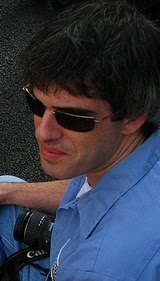
Because I’m such a hip and happening author, I’m redoing my blog. Actually, I’m not redoing it. My friend Harry’s doing it. He’s hip and happening (check out his photo and wish for his cool, Daddy-O). The point of the blog is to make me LOOK that way.
Until now I’ve mused about the writing of my books, my book tours and research, about the world of publishing and otherwise, on Blogger. Which is simple and easy to use. However, I’m informed by friends who know about these things that Blogger looks dreadfully old-fashioned and that it’s not so easy to do anything but the simplest things on it.
So change I must. This is where Harry Rubenstein, who sings in Jerusalem’s most obscure band, in which I play bass, steps in. He also has a company which consults on company web sites and sets up professional blogs. Harry is doing my blog for nothing, because he’s a friend and because I’ve promised to base a character on him in a future novel who will either be killed or have fried artichoke thrown in his face.
[Note: This isn’t going to be one of those sad authorial blog posts which lament the fact that writers can no longer sit alone in their rooms for years thinking great thoughts before having to face the world. (If that’s how I viewed blogging, I wouldn’t write a blog post about it. Surprising how many writers don’t quite get that irony…)]
I’m quite happy to engage in blogging, social networking, making videos for Youtube, guest blogging and virtual book-touring. (Only “quite happy,” because after all I’m not a teenager.) I’ve put a lot of time into making www.mattbeynonrees.com a good central site for all interviews and articles and reviews… and photos and audio and video… and stuff in foreign languages… and links to my social networking profiles.
But the blog didn’t look so good. Time for a change.
As I’ve had professional help with this, I thought I’d lay out for any writer out there who’s getting more into the interweb thingy (pretty much everyone, if the people I meet at crime writing conferences are a representative sample) how to go about it.
First, the blog needs to be on WordPress. Word Press isn’t as simple to set up as Blogger. You may need a computer savvy type to help you create the blog.
Get your domain name (the www…etc.) and sign up for a server. A good server provider is BlueHost.com.
Set up a blog account at WordPress. But, you say, that gives you a page that looks very basic, too basic in fact. For the “theme” that makes it look like an actual blog, you go to a site like Woothemes or Themeforest. Pick one you like, then get your computer savvy friend to, as it were, superimpose the theme over the basic blog.
Still with your computer savvy friend, put in a few widgets. Most of these are invisible to the blog reader (spam filters, for example), but others can be seen. Like the Youtube widget which allows you to embed a Youtube video on your homepage.
Ok, so now you’ve got a blog. Which is where Blogger stops.
But WordPress has what’re called static pages. That’s more like a website. You have the blog page, probably as your Homepage. But then you have a tool bar along the top with other static pages. Let’s say those pages are: About (your bio,) Books (yours, of course), Contact.
To sign up for a good Contact form, rather than having people email you, go to http://kontactr.com/signup/.
Then you can quite easily load up the other pages with all the stuff that you might otherwise put onto a website. The WordPress blog can, essentially, be your website. The web designer who made my main website says she now designs all her sites on Word Press.
Once you’ve sat with your computer pal in front of your new WordPress dashboard for just a matter of minutes you’ll be able to post your blog musings with natty little photos beside them. You’ll post links to other people’s websites. They will in turn post links to yours and make you famous all over the internet.
Then, when your eyes are so blurry you can’t really see any more… Well, then it’s time for you to go and write your book. For the checklist on how to do that, you’ll have to wait for another week…
Euro Bestsellers, UK-US Blockbusters
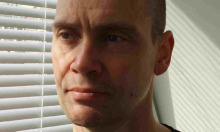 Crime novelist Simon Beckett wrote a few days ago in The Guardian that he’d had no idea he was the best-selling British novelist in Europe until statistics were announced last month. Not surprising, because at home no one has a clue who he is.
Crime novelist Simon Beckett wrote a few days ago in The Guardian that he’d had no idea he was the best-selling British novelist in Europe until statistics were announced last month. Not surprising, because at home no one has a clue who he is.The n author of a series about a forensic anthropologist (hard to define, but it involves a lot of descriptions of decomposing bodies in gruesome detail, which’re rather well done) recounts his astonishment that he plays to big crowds, in particular in Germany.
I can vouch for this. I saw him in Hamburg at a festival at which I also appeared last year. He read before a crowd that filled a hall the size of an aircraft hangar and which treated him as if he were Brad Pitt. I was quite surprised by the women rushing his signing table. I'm not German -- I hadn't the foggiest notion who this fellow was.
Meanwhile, at home in Sheffield, Yorkshire, acquaintances approach Beckett wondering if he can make a living from writing, unaware that he’s sold millions of books. Unaware, because hardly any of them are sold in the UK.
Beckett’s article highlights a phenomenon among writers – not just in the crime genre. I come across quite a few novelists from the UK and the US who’re best sellers in European countries, but can’t get more than a handful to turn up for readings in their home countries. I think there’s more to this than differences in national reading tastes.
Though Beckett claims to be bemused by his situation, I think it can be explained by the differences in the ways books are sold in the US/UK and in Europe. American and British bookshops (and publishers) see their business as being carried by a few blockbuster books. A New York Times Magazine profile of James Patterson by Jonathan Mahler last month highlighted this trend and the effect it has on other non-blockbuster books. Anyone not on the blockbuster trajectory can find it hard to set up readings in stores and almost impossible to get journalists (tv, radio or print) to do interviews.
When I’ve traveled in Europe, however, I find myself touring smallish bookshops which consider it a necessary part of their business to host writers. Then there's a broad array of literary festivals, too. In each city, there’s a wide range of media ready to do interviews, even with first-time authors. Consequently a book not of the blockbuster type can attract publicity which – in the US and UK – would rarely be given to anything but a blockbuster author whose name you (and the journalist concerned) already heard a thousand times.
I suspect this won’t change soon. Why not?
For one thing, booksellers are more conservative in their ordering than ever. Largely due to the economic crisis – which resulted in Barnes and Noble having a dreadful 2009 – and insecurity about the future of publishing in an e-book age, big stores are ordering ahead only for one month at a time, rather than the three months or more publishers are accustomed to. That makes it hard for publishers to plan a big print run for all but the sure things.
As if things weren’t bad enough in publishing, the situation is compounded by worries in the journalism world. It’s hard for a journalist to take a stand against market trends these days. I’m a former journalist and I can state categorically that if there’s one group of people with more qualms about what the future holds for their industry than publishers, it’s journalists.
So how to get around this? Well, if you're a reader, why not follow the German bestseller lists? Here's one which recommends the best new crime novels each month. You'll find a broader range of reading and books which might surprise you. You'll also be ahead of the sales figures back home and be able to get a front row seat at the scantily attended readings of the next Simon Beckett.
Published on February 13, 2010 10:05
•
Tags:
bestsellers, blockbusters, bookshops, crime-fiction, david-hunter, germany, hamburg, james-patterson, jonathan-mahler, new-york-times-magazine, publishing, simon-beckett, the-guardian
Soggy sheep at breakfast
 I was under the impression that the English weren’t allowed into Wales any more, now that Tony Blair persuaded us we ought to have at least half a government of our own and let Westminster pay for it. I assume Colin Cotterill managed to make it through the border undercover on his Australian passport. Which is a good thing, because his blog post of this week was a lovely appreciations of my homeland, even down to the 28 yards of daily rainfall for which I yearn as I swelter through 40-degree desert heat here in Jerusalem.
I was under the impression that the English weren’t allowed into Wales any more, now that Tony Blair persuaded us we ought to have at least half a government of our own and let Westminster pay for it. I assume Colin Cotterill managed to make it through the border undercover on his Australian passport. Which is a good thing, because his blog post of this week was a lovely appreciations of my homeland, even down to the 28 yards of daily rainfall for which I yearn as I swelter through 40-degree desert heat here in Jerusalem.During his stay at the Hay-on-Wye Book Festival, Colin muses that a soggy sheep would be less attractive than a dry one. A dry sheep may conjure up pleasanter images of romantic moments in the haybarn (in a land where there are more sheep than humans, romance might occasionally include a sheep.) There is, however, considerable lanolin in the sheep’s wool, so the rainfall doesn’t penetrate to the sheep’s body and therefore a good shake would be all that’s needed to dry him or her out – for further investigation, as it were.
I hope that clears things up for you, Colin. Next time you’re at the Hay festival, even if it’s raining, sheep are the perfect antidote. (Why do you think all those fat, boozed up London publishing types come all the way to the countryside?) Take this old Welsh joke as your cue:
A man walks into a pub. “Jones has been found having sex with a sheep,” he says. The barman looks up and asks, “Was it a male sheep or a female sheep?” “A female sheep, of course,” says the man. “There’s nothing wrong with Jones.”
Read the rest of this post at my blog
Published on June 23, 2010 07:53
•
Tags:
colin-cotterill, england, hay-book-festival, israel, jerusalem, london, publishing, sheep, ustralia, wales
Signing up
 A book takes a long time to write, and then it takes a while to sell. And another while to sell in another country, and another after that. So a writer’s smile spreads across time.
A book takes a long time to write, and then it takes a while to sell. And another while to sell in another country, and another after that. So a writer’s smile spreads across time.My long-term grin widened this weekend, when I signed with my UK publisher for my next two books. Not only because Atlantic, the excellent publisher which has brought out all four of my Palestinian crime novels, bought my next books. But because Atlantic is launching a very exciting new imprint called Corvus.
The new imprint is headed by Nicolas and Anthony Cheetham, a father and son team who made Quercus such an important imprint. They’ve taken on my next book MOZART’S LAST ARIA, which is already completed and being edited in New York by the delightful Claire Wachtel at HarperCollins, and the novel I’m currently writing, which has the working title CARAVAGGIO ON FIRE. It’s about the Italian artist who, incidentally, is thought to have died 400 years ago on Sunday.
Writers will know what I mean when I say that signing the contract is a wonderful marker, but also similar to many other things in a writer’s life – it seems like a big milestone, but no one’s around to witness it except you, so you have to go inside yourself to enjoy the moment.
Read the rest of this post on my blog The Man of Twists and Turns.
Published on July 22, 2010 02:10
•
Tags:
after-sex, anthony-cheetham, atlantic-books, brooke-shields, caravaggio, caravaggio-on-fire, claire-wachtel, contracts, corvus, crime-fiction, greece, harpercollins, historical-fiction, mozart, mozart-s-last-aria, nicolas-cheetham, palestine, publicity, publishing, the-collaborator-of-bethlehem, thomas-m-kostigen, writing



